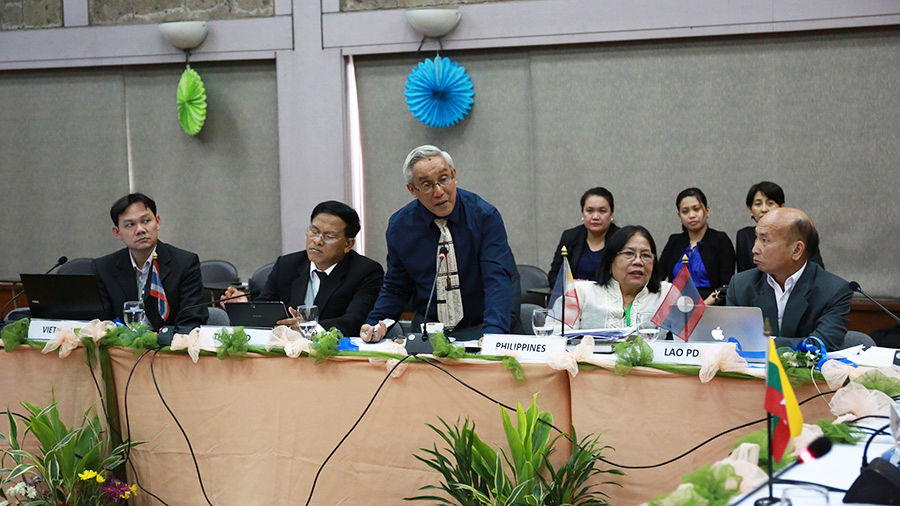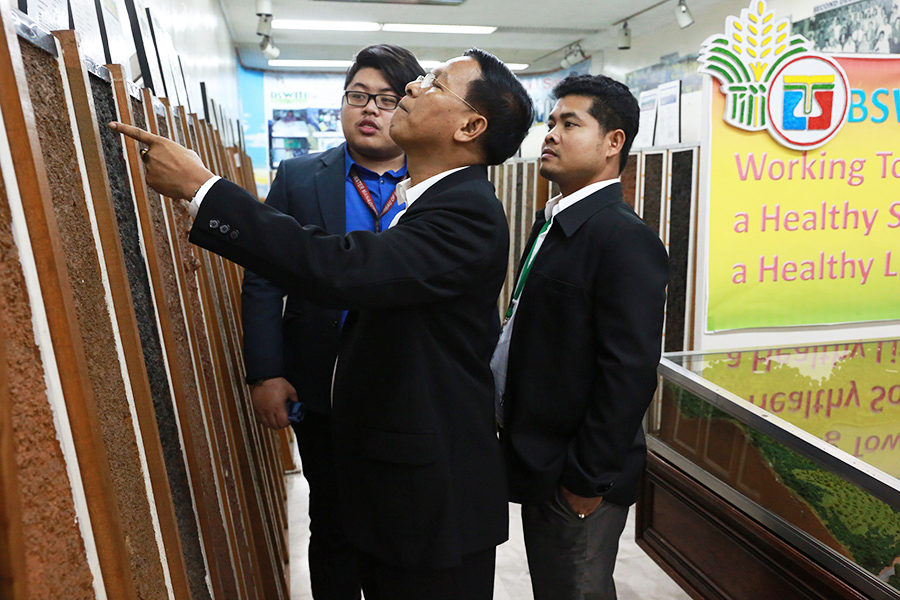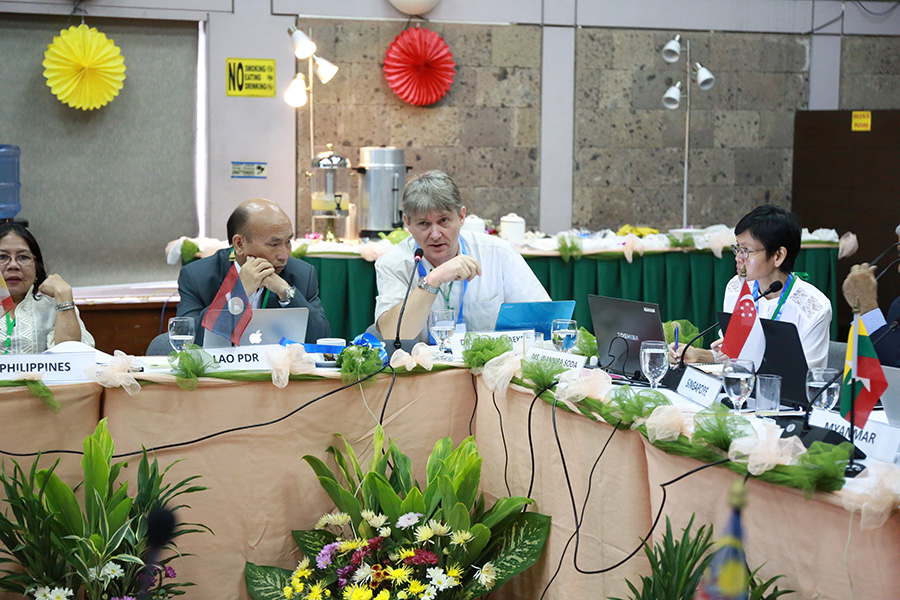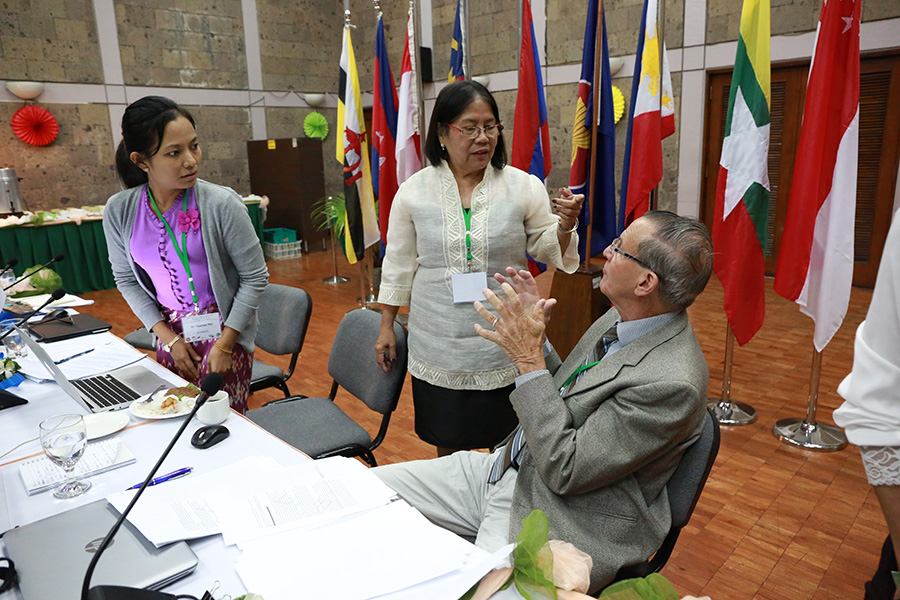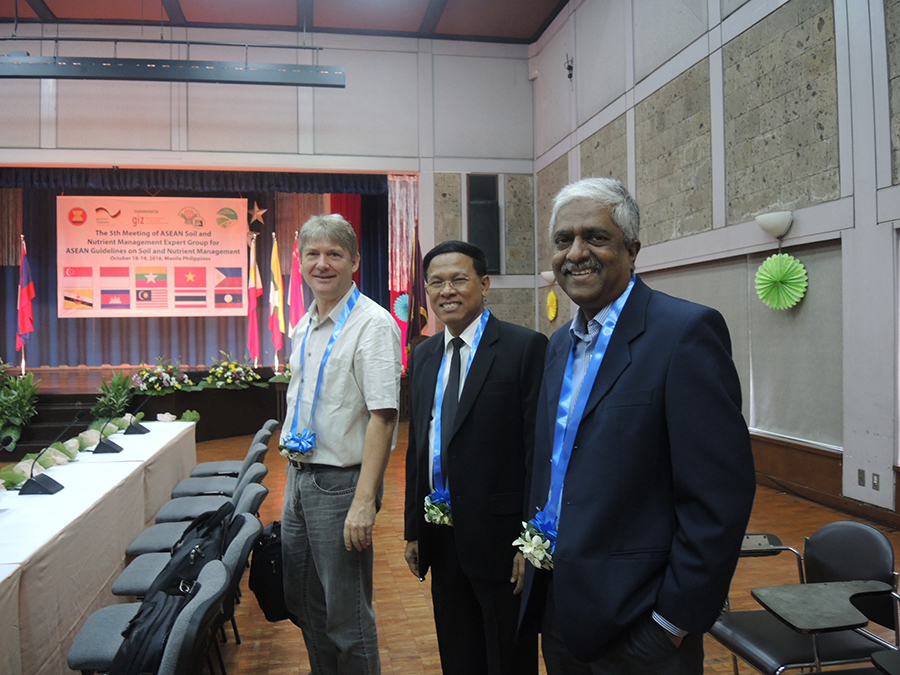
Writer: Rojana Manowalailao, ASEAN Sustainable Agrifood Systems
Senator Cynthia Villar of the Philippines highlights sustainable soil management to achieve “Available and Affordable Food for the Filipino”.
In her keynote address at the 5th meeting of the ASEAN Expert Group on Soil and Nutrient Management (SNM) on 18-19 October 2016 in Manila, Senator Cynthia Villar cited the Philippines cooperation for the development of regional guidance to formulate national policies that encourage sustainable agriculture, crop production, and soil health.
Senator Cynthia Villar’s Keynote Address
“We warmly welcome to the Philippines the guests, delegates and participants to the 5th ASEAN Meeting on Guidelines on Soil and Nutrient Management.

It is indeed a very timely meeting by the ASEAN Expert Group because our new administration under President Rodrigo Duterte considers as priority the establishment of color-coded soil fertility map that our farmers can use as guide to boost agricultural production in our country. The Bureau of Soil and Water Management (BSWM) of the Department of Agriculture, this ASEAN meeting host, is in fact, in the midst of flurry of field activities to come up with color-coded maps relating to practical soil and nutrient guidelines for rice production areas, to meet the deadlines set by our president.
Department of Agriculture Secretary Emmanuel F. Piñol has also ordered to complete the soil mapping analysis to accomplish the administration’s goal of achieving “Available and Affordable Food for the Filipino”. We have been focusing our attention on increasing rice productivity to feed our increasing population. And we are very well aware that without a sustainable and productive soil resources with which to anchor our production targets, food sufficiency will be just a dream. We acknowledge the important role of soil as a critical success factor to attain food security for this nation.
As defined by ASEAN soil experts, soil nutrient management is an integrated system to manage soils, nutrients, and crops in a sustainable manner to optimize crop production and improve soil health. To grow what we eat and to eat what we grow, we need healthy soils. We need to protect our prime agricultural lands from degradation which can come in the form of neglect as manifested by increased erosion or in the form of abuse such as over fertilization, excessive pesticide application, and intensive cropping system. We need to take the necessary steps to ensure that our soils remain healthy.
We are also alarmed about threats to healthy soils and we are taking action in reversing those threats. Among which is soil degradation, which has reached 33 percent globally and 38 percent here in the Philippines. Based on data from the Bureau of Soils and Water Management, out of the Philippines’ total land area of 29.55 million hectares, 11.45 million hectares are ‘vulnerable areas’ to land degradation or moderately to severely degraded, and 2.6 million hectares are ‘hotspots’ or in an advanced stage of land degradation and, as such priority areas for conservation measures.
Soil degradation is a threat globally, every minute we lose the equivalent of 30 football pitches of fertile soil. The threat is even more alarming in Asia, according to the Food and Agriculture Organization (FAO). Our region needs soil more than ever to satisfy the demands of the growing population. By 2050, we need to increase food production by at least 60 per cent to meet the needs of an additional two billion more people. Around 95 percent of our food comes from the soil. As per FAO data, most of the arable land in Asia is already fully utilized. Thus, it is imperative for us to save our soils, which is a non-renewable resource. It takes up to a thousand years for just one centimeter of topsoil to form.
This ASEAN soil experts meeting should be able to provide the necessary guidance that helps decision makers to formulate policies that encourage sustainable agriculture, crop production, and soil health. Giving emphasis on the creation of sustainable agriculture path improves the quality of life of our farmers, and ensures the productive capacity of our agricultural lands for our future generation. Any proposed new policies towards modernization and sustainable development of local agriculture need to be balanced by preserving our agricultural heritage systems that sums up centuries of wisdom and learnings on sustainable agricultural production.
Organic farming helps maintain the health of soils as it retains higher levels of essential organic matter. And there is more to organic farming than reducing the use of pesticides. It also includes crop rotation, intercropping and composting. Thus, we are intensifying our campaign in the promotion of organic farming.
Actually, our country has a National Organic Agriculture Program, which envisions the organic agriculture sector contributing to the overall agricultural growth and development of the country in terms of sustainability, competitiveness and food security. Under the said program, at least five percent of Philippine agricultural farm will be converted into organic by this year.
With this ASEAN experts meeting, which is expected to harmonize recommendation to improve soil and nutrient management, we are looking forward to learn more. And considering how soils differ, climate differs, vegetation differs, topography differs and culture differs from one are to another, we have set ourselves some ambitious goals for the ASEAN region. Thus, at this early, let me congratulate you in advance even for such efforts.
Regional consolidation of good soil and nutrient management practices, as well as standards, is a very important area of cooperation, and the Bureau of Soil and Water Management has much to share our ASEAN friends and neighbors with its past and current programs on balanced fertilization, organic agriculture, soil conservation, and sustainable corn production in sloping agricultural lands. It also has several researches not only in the area of soil fertility but also other basic soil science disciplines like soil chemistry, soil physics and mineralogy, and soil biology.
In closing, let me emphasize that the Philippines in general, is committed to the task of producing food for the nation, together with the Department of Agriculture, we would like to ensure that healthy soil is at the forefront of our policies and programs. And that the specific ASEAN task on soil and nutrient management is an important policy consideration and as cited earlier, it is among the priorities of the administration of President Duterte.
We assure you of the Philippines cooperation and we thank you very much for considering soil and nutrient management as an important area of collaboration in the region. Once more, welcome to the Philippines, I wish you success in your workshop-meeting. Have a good day!”
The 5th meeting of the ASEAN Expert Group on Soil and Nutrient Management
The 5th meeting of the ASEAN Expert Group on Soil and Nutrient Management (SNM) was held on 18-19 October 2016 in Department of Agriculture Manila, Philippines. This two-day regional consultation meeting was attended by members of the ASEAN Expert Group on SNM from ten ASEAN Member States (AMS): Brunei, Cambodia, Indonesia, Lao PDR, Malaysia, Myanmar, Philippines, Singapore, Thailand, and Vietnam. The meeting was facilitated by Ms. Wannipa Soda, ASEAN Sustainable Agrifood Systems expert in Soil and Nutrient Management. It was hosted by Department of Agriculture, Bureau of Soil and Water Management (BSWM)
The meeting was officially opened by Ms. Sonia M. Salguero, Director of the Bureau of Soils and Water Management under the Department of Agriculture Manila, Philippines, followed by the Message by Hon. Emmanuel F. Piñol Emmanuel F. Pinol, Secretary Department of Agriculture. The opening ceremony was delivered by Senator Cynthia Villar.
The objective of this 5thth Meeting was to review the final texts of ASEAN guidelines on Soil and Nutrient Management draft contents. The development of ASEAN guidelines on Soil and Nutrient Management to provide regionally coordinated guidance and to facilitate decision makers in formulation of policy recommendations on soil and nutrient management has been making progress towards its completion. It was expected that this two-day meeting would be resulting in critical and solid comments and feedback on the final draft, as well as future needs to foster the implementing of the guidelines in AMS.
In particular, the expert group discussion is dedicated for consideration of contents from a whole-of-ASEAN regional perspective, including accuracies of important facts and figures presented in these guidelines. As individual, AMS delegates need to focus on important issues related to their context if any key information has been left out. The group needs also to focus on opportunities and recommendations for future implementation of these guidelines.
The 4th ASEAN Expert Group Meeting was held in Brunei Darusslam on 11 – 12 May 2016 for a review of contents based on synthesis report of country inputs. A number of issues regarding finalization of the guidelines were highlighted including additional data requirement for improvement of the contents from AMS. The outcomes of the 4th meeting were incorporated to a new draft of improved contents for finalization of exert group at the 5th meeting in the Philippines.
